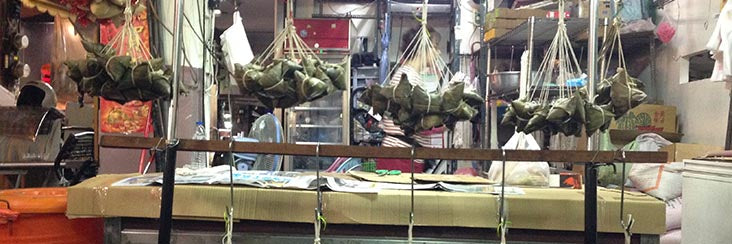
Dragon Boat Concubine
June 2nd was the fifth day of the fifth month in the lunar calendar - Dragon Boat Festival - a national holiday here in Taiwan. I rode up to tea country and visited my friend and Dong Ding Oolong artisan who invited me to come and eat “zhongzi”. These are the traditional sticky rice dumplings wrapped in bamboo leaves that are a main aspect of this holiday. Following Chinese New Year, this is the most culturally representative holiday of the year. It dates back thousands of years and connotes the themes of loyalty to country and family. When my friend’s father heard I was coming, he prepared two big bunches of zhongzi to share with me. Young’s wife made two kinds – savory and sweet. Both were really delicious, although I only took home a portion of what they offered.
Young proceeded to brew two different batches of spring Dong Ding Oolong that he roasted after I had bought a batch from him a couple weeks before. We tasted them side-by-side to compare the slightly different roasting techniques he used. In the process, I reaffirmed the fact that Traditional Dong Ding Oolong made from this village at the foot of Phoenix Mountain is my all-time favorite kind of tea.
We then took a short walk down the lane to his smaller tea garden to see the new growth of leaves on the plants that were being affected by the “green leaf hopper”. This tiny insect feeds on the sap of the tender new tea leaves and causes an immune system response in the plant that results in a unique flavor in the tea made from these leaves. This flavor is what has made Oriental Beauty and subsequently Concubine Oolong famous.

Young thought it was a good opportunity for me to see the bugs in action, and how the leaves are affected. He pointed out how the leaves had a distinctly yellow tint that was indicative of the leaf hopper’s effect. What I had previously observed in brewing “bug bitten” tea leaves as visible scarring and small holes in the leaf and attributed to the leaf hopper was incorrect. The visible scarring is the effect of another insect. Since tea leaves that are intended to make Oriental Beauty or Concubine are cultivated without pesticides in order to accommodate the leaf hopper, the plants must endure the effects of all environmental “pests”.
The leaf hopper’s effect also causes partial oxidation in the leaves while they are still growing on the plant. This oxidation, along with the immunity response in the plant are what produce the special character of this tea. It also has the effect of the plants producing only a fraction of the yield that is attained with the use of pesticides. So this tea is dear as a result.
Young, being a teacher of Taiwanese dialect in the local elementary school, went on to tell me the meaning of the name that local farmers call this tea. Since the special flavor is the result of this cute little bright green insect biting the tea leaves, it became known among locals as “yenahday” which translates literally as “bug spittle tea”. As the Taiwanese dialect is full of humorous pun-like connotations in its use, some farmer decided that this unique flavor came from the saliva of these bugs – as if it were a special sauce used to make some sort of delicacy!

The tea leaves in these photos were harvested two days after Dragon Boat Festival. As the effects of the leaf hopper are always different and unpredictable, producing this tea is a bit of a gamble, or at least an experiment that is conducted based on experience. My oolong artisan friends have all spoken about how these tea leaves go through unexplained changes post-production, and how the effects of roasting are different every time. Young has roasted a small batch from this harvest 3 times already. He told me yesterday that he is satisfied with the results gained from the 3rd roasting. I will visit him this Sunday and very likely procure this unique small batch of “bug spittle tea”.
This snapshot is from the local market on my street where "zhongzi" were being sold in preparation for the holiday.




